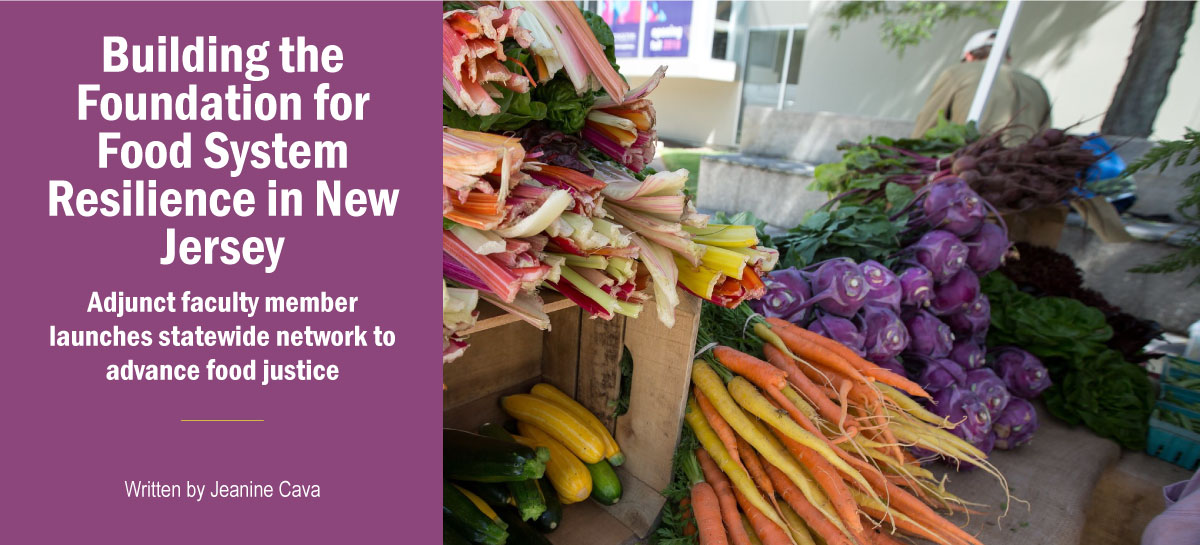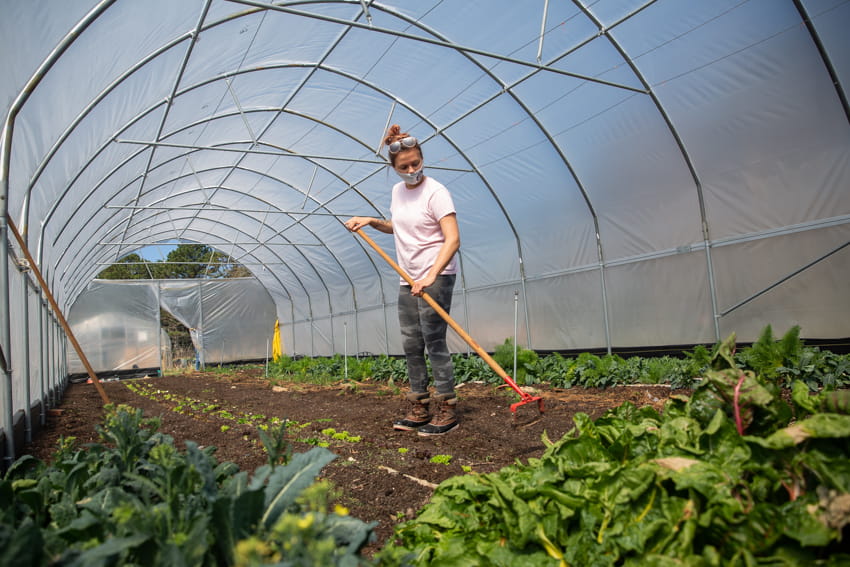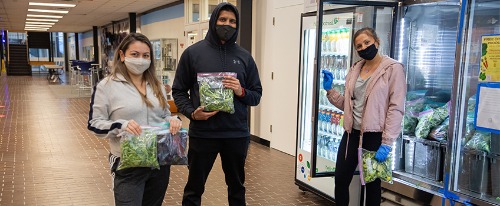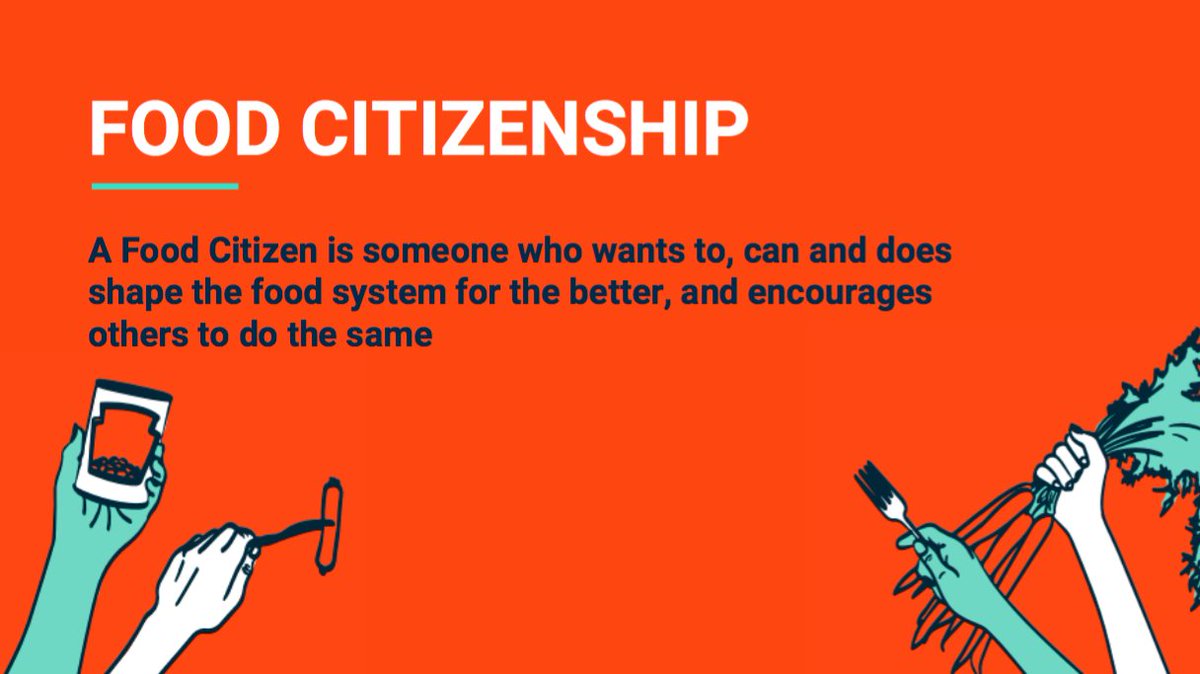Building the foundation for Food System Resilience in NJ
Fall 2021 Issue

Image of produce from Stockton's Sustainable Farm. Photo Credit: Stockton University.
The NJ New Jersey Food Democracy Collaborative (NJFDC), a statewide network of more than 200 food system stakeholders, is approaching its one-year anniversary with a long list of accomplishments and tangible impact. THE The NJFDC was assembled and organized by Sustainability program faculty members Jeanine Cava and Ron Hutchinson. In addition to teaching a GIS course on food systems, for the past 15 years Cava has built a large grassroots sustainable food systems movement in New Jersey.
Launched in June 2020 during the COVID-19 pandemic, the NJFDC fills a critical need - the lack of a state-level entity that looks at New Jersey’s entire food system. The NJFDC connects different system sectors throughout the state and creates opportunities for collaboration and capacity, building on urgent food system needs like disparities in access to fresh food, as well as the unique challenges facing small, urban, beginner BIPOC farmers. Inspired by the food policy council model, the NJFDC utilizes set criteria for resilience in food systems as guiding tenets for this growing collaborative.
Student Research Projects
This past spring, two student projects emerged as a result of the NJFDC, connecting students to the Stockton Sustainability Farm and a deeper understanding of its role in the food system. The first was the idea of Alison Taylor, a junior in the Sustainability program who had recently completed Cava’s food systems course. Taylor created Food Secure Ospreys to connect students with the fresh produce harvested on the campus farm. She used social media to raise awareness for the project, which was inspired by an account at the University of California Merced she learned about in class. Cava and Taylor connected via Zoom with the student food access team from UC Merced, in addition to a team from the Dean of Students Office that coordinates Stockton’s two student food pantries. To learn more about Food Secure Ospreys, follow it on Instagram at @foodsecureospreys. The second student project is a collaboration between two students in Stockton’s Environmental Studies program, Destiny Jerkins and Haley McGreen, and two students in Rowan’s Summer Undergraduate Research program. Together, they created an organizational map of New Jersey’s food system governance. The students, along with Nicole Vaughn, assistant professor of Community Health at Rowan, and Cava are tracking how funding flows from federal agencies and programs, like the USDA, into various state agencies that impact the food system, in addition to how those funds flow through various state programs to counties, municipalities, community groups and specific food system stakeholders such as farmers and consumers. The map provides a clearer picture of New Jersey’s food system governance structure.

The second student project is a collaboration between two students in Stockton’s Environmental Studies program, Destiny Jerkins and Haley McGreen, and two students in Rowan’s Summer Undergraduate Research program. Together, they created an organizational map of New Jersey’s food system governance. The students, along with Nicole Vaughn, assistant professor of Community Health at Rowan, and Cava are tracking how funding flows from federal agencies and programs, like the USDA, into various state agencies that impact the food system, in addition to how those funds flow through various state programs to counties, municipalities, community groups and specific food system stakeholders such as farmers and consumers. The map provides a clearer picture of New Jersey’s food system governance structure.

Responding to the State’s Request for Information about ‘Food Deserts’ and Food Insecurity in N.J.
In March 2021, the N.J. Economic Development Authority (NJEDA) issued a request for information from the public about how the state can better address food insecurity and “food deserts'' in under-resourced communities. A dedicated cohort of NJFDC partners came together and committed more than 150 hours of time to provide answers to these important questions. Rooted in academic literature, qualitative data gleaned from The New Hampshire Food Democracy Collaborative NHFDC food system stakeholder meetings in 2020 and on-the-ground knowledge of New Jersey’s food system, the responses provided the NJEDA with robust information and strategies to support thriving, inclusive local food systems across the state. Please review the response here.
Convening Experts on Key Issues
Over the past 12 months, the NJFDC held 12 different listening sessions and panel discussions on specific food system issues, such as inclusivity and equity, as well as agricultural gleaning and food waste. Notably, in April 2021 a panel discussion was held on how to leverage health care institutions. to create robust and resilient local food economies. This discussion was attended by N.J. Secretary of Agriculture Douglas Fisher and Deputy Commissioner for Public Health Services Dr. David Adinaro.
On June 16, 2021, the NJFDC and several of its institutional partners, including Rutgers University and Montclair State University, hosted a discussion about the opportunities and challenges, in addition to the national and state statuses, of the food policy council model for tackling complex food system issues.
Creating a “N.J. Food System Resource Hub” at Stockton University
With the support of three student interns from the Sustainability and Communications Programs, Cava is developing an online directory of the organizations, programs and resources that support the transition to a more equitable and resilient food system for NJ. Partners of the Food Democracy Collaborative – farmers, food access and anti-hunger professionals, researchers, farmers market managers, and others, can add their information to the directory, and include information on notable achievements from 2020 and 2021. The directory will be available online as a “hub” of information about what’s going on across the state.
Completion of the first draft is slated for the First Annual State of the Food System Symposium on 12/3/21. Registration for that (virtual) event is open.




